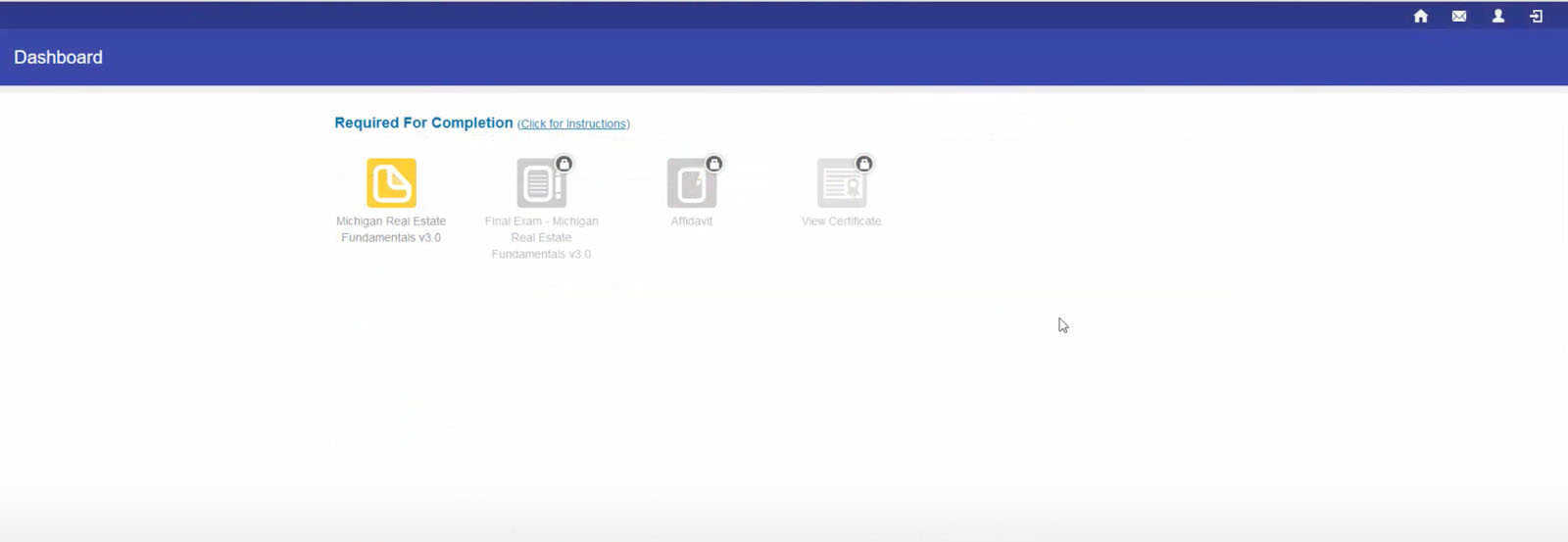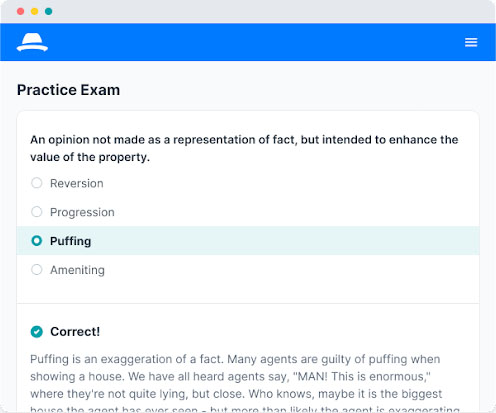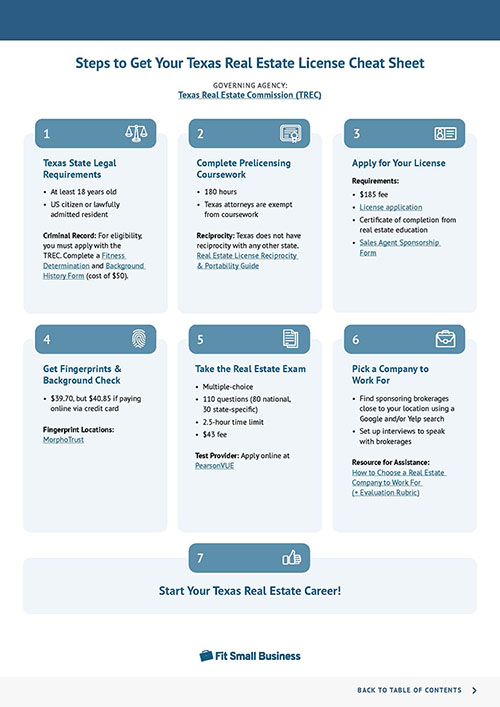Embarking on a career in Texas (TX) real estate provides a lucrative opportunity to help others achieve homeownership. As regulated by the Texas Real Estate Commission (TREC), prospective agents must complete 180 hours of coursework, pass the state licensing exam, submit to fingerprinting and a background check, and align with a sponsoring broker to kick-start their career. Read along for a full breakdown, and download our cheat sheet for a quick guide to easily navigating the Texas real estate license process.
Step 1. Meet the Texas Real Estate License Requirements
- You must be at least 18 years old
- You must be a U.S. citizen or lawfully admitted resident
- You must possess a high school diploma or GED
- You must meet TREC’s qualifications for honesty, trustworthiness, and integrity through the Fitness Determination form.
For those with a criminal record wondering how to get a real estate license in Texas:
- You may still be eligible for a TX real estate license, but must undergo a review of your criminal history.
- Submit a completed Moral Character Determination Form before starting your prelicensing education to understand potential licensure implications.
- Provide all criminal history records, court documents, and any letters of reference or explanation.
- Be prepared for a potential investigation or additional questioning by the Texas Real Estate Commission.
Step 2. Complete Prelicensing Courses
If you meet the state’s legal requirements, it’s time to start your 180 hours of prelicensing education. The courses can be taken in person or at an accredited online real estate school for between $105 and $1,089, depending on the provider. The courses will cover topics needed to pass the exam and state-specific information like land use regulations, property rights, and special Texas property taxes and exemptions.

Kaplan course dashboard
Kaplan Real Estate Education is a reputable provider offering a range of prelicensing courses, exam preparation tools, and continuing education options for aspiring real estate professionals. Known for its user-friendly course formats, Kaplan provides online and in-person learning opportunities tailored to various state-specific licensing requirements. With a focus on success and career development, Kaplan combines industry expertise, innovative technology, and practical teaching methods to empower students to excel in their real estate careers.
Read more about the best real estate schools in Texas in our article, 6 Best Online Real Estate Schools in Texas.
Want to Skip Texas Education?
Texas does not have reciprocity agreements with other states, making it a physical location state concerning portability. While real estate agents are permitted to handle real estate transactions in other states, they are prohibited from physically entering Texas for real estate activities. This means all transactions involving Texas properties must be managed remotely by out-of-state agents or brokers, and the agent may not enter the state for showings, closings, or any other real estate duties.
Step 3. Apply for Your Texas Real Estate License
Once you’ve completed the education requirements with a reputable school, you must submit your application to the TREC, which gives you one year to complete the remaining steps in the licensing process. In addition to the application, you will be required to submit an application fee and additional documentation to complete your application for your real estate license in Texas. See the details below:
Application Form | |
|---|---|
Where to Submit Application | Send in via mail or through the online portal |
Documentation Required | College transcripts or course completion certificates |
Application Fee | $205 |
Step 4. Get Fingerprints & Background Check
All applicants are required to submit fingerprints as part of a background check for eligibility to get a Texas real estate license. Here are the details:
- Schedule an appointment with an approved fingerprint service provider such as IdentoGO.
- Be sure to bring a valid form of identification and eligibility letter from the TREC to your appointment.
- Pay the fingerprinting fee.
- The fingerprinting service provider will electronically submit your fingerprints to the Texas Department of Public Safety (DPS) and the FBI for a background check.
- Track the status of your background check through the TREC website.
Step 5. Schedule & Take the Texas Real Estate Exam
After you finish the prelicensing coursework, you must pass the Texas real estate exam. The exam is given on the computer (unless otherwise requested) and split into national and state-specific portions. You must pass both portions in order to move forward with your licensure. The exam is conducted by Pearson VUE, a national provider of state licensing exams. To begin scheduling, you must:
- Make an online exam reservation 24 hours before the desired examination date
- Pay exam fee of $43 directly through the Pearson website via credit card, debit card, or voucher
You’ll receive a copy of the Texas Candidate Information Bulletin, which contains testing information and sample questions. Here is a summary of the main exam details:
Test Format | Multiple choice |
Number of Questions | 125 questions
|
Time Limit | 240 minutes |
Items to Bring to Exam | 2 valid forms of identification with signatures:
|
Score to Pass Exam |
|
Reported Pass Rate |
If you pass the exam, move on to the next step. If you do not pass, you can retake the exam three times within 12 months of finishing your prelicensing education. Utilizing exam preparation questions before retaking the exam can ensure you’re prepared to pass the test. Also, if you do fail, you will be provided a diagnostic report of your strengths and weaknesses so that you can study for the appropriate portion, national or state, that you need to review and retake.

Sample practice exam (Source: PrepAgent)
Aspiring Texas real estate agents can leverage platforms like PrepAgent to help prepare for the final exams. With a focus on interactive learning, PrepAgent provides study materials like practice tests, flashcards, and real-time webinars, all designed to enhance understanding and retention of key real estate concepts. PrepAgent tailors its materials to meet the specific requirements of various state exams and is renowned for its user-friendly interface and up-to-date content. Its commitment to helping students pass on the first try is backed by its money-back guarantee.
Step 6. Pick a Sponsoring Brokerage
To hold an active Texas real estate license, you must find a sponsoring brokerage to affiliate your license. A sponsoring brokerage is a real estate company, like Keller Williams or Coldwell Banker, where your license will “hang” and you can conduct business as a real estate agent. Here are some things to think about when deciding on which brokerage you’ll work with:
- Do you want to work at a national franchise, boutique, or virtual brokerage?
- What kind of training will be provided to you?
- What are the commission splits?
- Will you go solo or join a team?
- What is the reputation of the brokerage?
- Are there technological tools like client relationship management (CRM) systems, lead generation, and marketing?
Step 7. Start Your Real Estate Career
Once you’ve completed all the above steps, you are ready to start your career as a real estate agent!
How to Retain & Renew Your Texas License With Continuing Education
All real estate agents are required to do continuing education every few years to renew their license. This will guarantee you stay up to date with new laws and regulations and have the latest education on best real estate practices. Each state requires a different number of hours, and some states also require post-licensing education. Here is what is required in the state of Texas with a renewal cycle of every two years:
- Salesperson—first license renewal only: 270 hours
- Sales Apprentice Education (SAE): 6-hour Broker Responsibility course and 98 hours of SAE courses
- Salesperson continuing education hours required: 18 hours
- Broker continuing education hours required: 18 hours
- Designated Broker continuing education hours required: 18 hours
Reasons to Get a Texas Real Estate License
Understanding how to become a real estate agent in Texas is vital for those aspiring to join this lucrative career. It requires a solid knowledge of the real estate market throughout Texas, particularly in the area where you plan to conduct your business.

- In Texas, the average days on the market is 52 days.
- Cinco Ranch is the most competitive city in Texas.
- Active housing listings in Texas have increased 4.1% month-over-month.
- Texas median housing price is $340,000.
- Average salary for Texas real estate agents is $83,643.
- In November 2023, the Texas housing market saw an increase in available homes, with 129,867 properties listed for sale.
- Pharr (52.3%) is the top metro in Texas with the fastest-growing sales price.
Not Your State? Find Yours Here
Did you stumble here by mistake, or are looking to get your license in another state? Click on the link for your state below to be directed to instructions on how to get your license in any one of the 50 states:
Alaska
Arizona
Arkansas
California
Colorado
Connecticut
Delaware
Florida
Georgia
Hawaii
Idaho
Illinois
Indiana
Iowa
Kansas
Kentucky
Maine
Maryland
Massachusetts
Michigan
Minnesota
Mississippi
Missouri
Montana
Nebraska
Nevada
New Hampshire
New Jersey
New Mexico
New York
North Carolina
North Dakota
Oklahoma
Oregon
Pennsylvania
Rhode Island
South Carolina
South Dakota
Tennessee
Texas
Utah
Vermont
Virginia
Washington
West Virginia
Wisconsin
Wyoming
Frequently Asked Questions (FAQs)
In Texas, aspiring real estate agents must complete 180 classroom hours of prelicensing education from an approved education provider. The curriculum is designed to provide comprehensive knowledge of real estate principles, law, finance, and practice. Subjects include Principles of Real Estate, Law of Agency, Law of Contracts, and more. Upon completion, candidates are required to furnish certificates of completion when applying for the state examination.
The time frame for obtaining a real estate license in Texas varies depending on individual circumstances. Generally, the process involves completing the required education, passing the licensing examination, undergoing a background check, and securing sponsorship from a licensed Texas real estate broker. The educational component can be completed at one’s own pace, typically ranging from a few months to a year. The subsequent steps, including application processing, exam scheduling, and awaiting results, may add additional weeks or months to the timeline.
The Texas Real Estate Commission assesses each applicant with a criminal background individually. While a criminal record does not automatically disqualify you, it’s crucial to disclose all relevant information during the application process. TREC considers the nature, severity, and recency of the offense, as well as rehabilitation efforts and other character references. Applicants are encouraged to submit a Moral Character Determination Form before starting their prelicensing education. This preliminary evaluation provides insight into whether one’s criminal history might affect the ability to obtain a license.
Bottom Line
Obtaining a Texas real estate license is a structured and detailed process designed to ensure that every agent is well-equipped with the necessary knowledge and ethical standards. From completing the required educational hours to navigating through finding a sponsoring broker and understanding state-specific regulations, each step is crucial in shaping a successful real estate career. Whether you’re a new entrant or an experienced agent from another state, learning how to become a real estate agent in Texas is key to accessing the real estate opportunities available in Texas.
